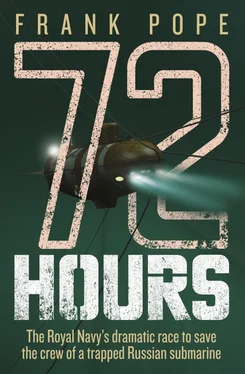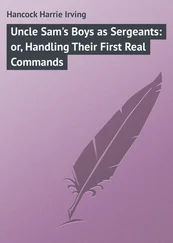‘The AS-28 has enough air for one day,’ Dygalo said. ‘We have a day and will continue our intense efforts to save the AS-28 and the people in it. The crew’s activity is being kept to a minimum.’
Yelena began a low moan. There had been nothing but contradictory accounts of how much time her husband had left to live. Naval Headquarters had said many days, and initially Captain Dygalo had said five. Though Yelena did not know it, Dygalo was the same officer who had first broken the news of the Kursk disaster to the Russian people, more than a day after the accident when the lifeless Kursk was still lying undiscovered on the seabed. Rescuers have established contact and are supplying air and no casualties have been reported , he had said at the time. None of it was true.
Tatiana Lepetyukha’s faith had so far kept her strong. She’d spurned the military’s offers of psychologists for her to talk to, preferring instead to rely on the Lord. That didn’t mean she was passive. She had installed herself at the local headquarters, where she could be kept immediately up to date with the progress of all aspects of the rescue operation. There she was also shielded from the rumour -mill that was raging outside. She’d already developed a dislike of the local journalists, especially the pushy women.
She’d left her 13-year-old son at home and had been shocked to get a panicked call from him saying that a woman was trying to get inside to ask him questions. Tatiana told him to say that it was the wrong door, that no one lived there any more. When that failed to send the insensitive journalist away, she’d said, ‘Tell them to go to hell.’ Roman followed her instructions and the woman had left, leaving Roman surprised at the power of popular Russian language.
When Yelena reached her flat in Petropavlovsk, she hadn’t been able to stand it inside. Although they’d just moved in, it already held too many memories of Slava. Boxes of his things still lay unpacked, and in the living room was a big model of AS-28 that he’d carved out of wood. So they drove on to Yelena’s sister, Svetlana, who lived up the road in Zavoyko.
Soon after they arrived Svetlana called the Naval Head quarters on Yelena’s behalf. There was no news from Bereyozova Bay, but they asked about Yelena’s whereabouts. The Department of Moral Welfare of the Forces wanted to send around a military psychologist to help her through these difficult times. Svetlana thought it sounded like a good idea, and encouraged Yelena to agree.
An hour or so later the psychologist arrived and began a brief physical examination of Yelena. He had not yet asked her any questions, but as he was strapping up her arm to test her blood pressure he started to muse.
‘I wonder how they can still survive down there, when they have reportedly no air left to breathe,’ he said.
Yelena whipped around and snarled, ‘How can you say such a thing? You, a doctor?’ she raged.
The psychologist’s only defence was to claim that such counselling was not his normal job, that he specialised in suicides.
Furious, she pushed him out of the flat as fast as she could. ‘Do you want me to hang myself?’ she shouted after him.
‘Pray,’ said the doctor as she slammed the door in his face. ‘There’s nothing else you can do.’
But the anger had focused Yelena and lifted her from her hysterical state. She began calling the staff of the Moral Welfare of the Forces department every few minutes. She’d only called a couple of times when there was another knock at the door. Yelena tore it open, expecting the psychologist again, but was instead confronted with a blonde woman whose face was vaguely familiar. The lady introduced herself as a reporter and offered brief condolences before coming quickly to the point. The only way to get the Navy to act would be to get the story out, the woman said. Yelena might hold the key to rescuing her husband. Yelena didn’t trust journalists as a rule, but when she realised this was Guzel Latypova, she decided to let her in.
Latypova was a good listener, and talking was what Yelena needed to do. Their conversation began broadly, but soon they were talking about Slava’s family and their long, proud history with the Navy’s submarine fleet and the harsh realities of modern Naval life. The more Latypova heard the more her heart bled for this woman, an innocent victim of the government’s neglect of Kamchatka’s proud people.
Together they watched the television news. It was another Naval official, Alexander Koslapov, the head of the Pacific Fleet’s press service. His words added lead to Yelena’s heart as she felt the terrible inertia of the Russian Navy. ‘The situation is atypical,’ Koslapov said. ‘But it’s not worth dramatising.’
Friday, 5 August
SS + 27 h
07.30 UK – 10.30 Moscow – 19.30 Kamchatka
Bristol
Riches was on the way to the Ministry of Defence’s Abbey Wood complex when the Command hotline mobile phone finally rang. It was the Duty Submarine Controller at Northwood.
‘Commander, there’s been an incident involving a submersible,’ he began.
‘Off Russia’s Kamchatka Peninsula with seven men on board,’ Riches cut in. ‘Fat lot of good a hotline is if the BBC get the news before we do.’
There was a pause. ‘We need a TTFR as soon as possible,’ came the level reply. The all-important estimate of the fastest Time To First Rescue they could offer.
‘I’m just getting into the office now. I’ll let you know when I’ve worked it out,’ Riches said, and hung up.
Abbey Wood was the support and logistical headquarters for all three of the Services: the Army, the Navy and the Air Force. Only from the air did the complex exude any Pentagon-like sense of power; as you swept up to the security gate it looked more like a snappy retail park than a military facility. It was created in 1996 over the scar of an old coal mine, and now fountains sprang from lakes that hugged white buildings with huge, sparkling windows. If it weren’t for the Ministry of Defence policeman on the gate and the occasional military uniform, there would be nothing much to indicate the military significance of the place.
Once inside Riches strode through the deserted, sunlit atria towards the part of the building that had been christened ‘Cedar Neigh bourhood’. He made his way through the labyrinth of unmanned desks belonging to the 250-person Submarine Support Integrated Project Team, until he found his own. While 245 of the desks housed people dedicated to keeping the Royal Navy’s submarines loaded with enough supplies, spares and equipment to keep them out there doing their job, only five belonged to Riches’ team – the ones responsible for trying to bring men back if anything went wrong.
His first move was to get on to the restricted website of the International Submarine Escape and Rescue Liaison Office, based in Norfolk, Virginia. ISMERLO had been established in the wake of the Kursk to help communication and coordination in the event of a similar disaster. Almost every submarine-toting nation used ISMERLO as its primary information node during an emergency, as did all of the top people in the field, both military and civilian. If anyone knew anything, it would be there. But the updates screen was barren.
Riches thought there must be something wrong. He called Commander Trond Juvik of the Royal Norwegian Navy, who was in charge of the site, clean forgetting that it was 02.30 in the morning on the east coast of the USA. Juvik had heard nothing, he said in a sleepy voice before hanging up.
This wasn’t how things went during exercises. Even when they weren’t physically participating in an exercise they’d get involved on ISMERLO, calculating and presenting realistic timelines to get their equipment to the scene. They’d never thought of practising without it.
Читать дальше












